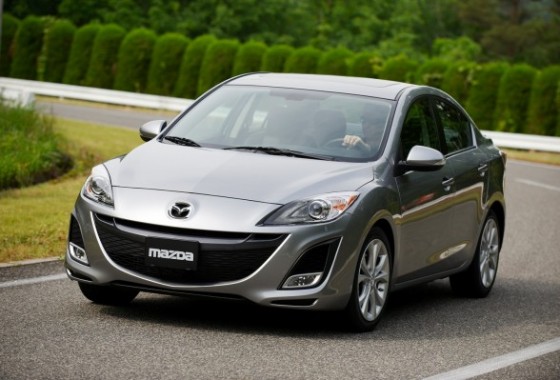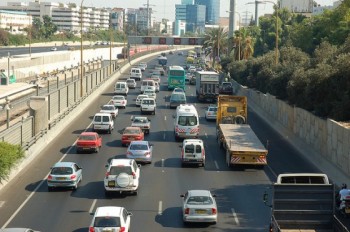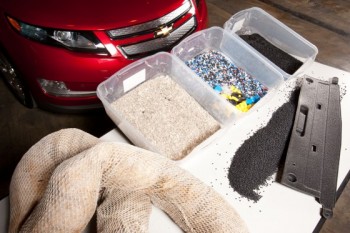 How much recyclable material will this new Mazda have when it goes to the shredder in 2030?
How much recyclable material will this new Mazda have when it goes to the shredder in 2030?
Lat year 2010 was a record year for new car sales Israel, according to an article just published in Globes. The article reports that 216,430 vehicles were bought during the year, a whopping 25.3 % more than in 2009. Of these 181,526 were private cars, which surpassed the amount sold in 2009 by 25%. What this means is that since environmentally friendly cars like electric cars are still in the testing stage, only a few of these nearly 1/4 million units will be converted to burn more environmentally friendly fuels like liquid petroleum gas.
Most of these cars will be burning either gasoline or diesel fuel, meaning that the environment will be the big loser – especially cities like Tel Aviv, where a law was recently passed to ban trucks from entering the city during the early morning rush hours.
“Normal” Tel Aviv freeway traffic
All of these new cars are joining a national “fleet” of nearly 3 million currently on the road, resulting in a vehic le “density” of more than 133 cars per kilometer in 2008, according to figures from Israel’s Ministry in 2009. This is compared to a vehicle density of only 10 per kilometer in 1960, when few Israelis owned private cars.
le “density” of more than 133 cars per kilometer in 2008, according to figures from Israel’s Ministry in 2009. This is compared to a vehicle density of only 10 per kilometer in 1960, when few Israelis owned private cars.
The terrible overcrowding of cars on the motorways of such a small country is largely the result of lease arrangements made with large companies who give their employees this “perk” as a part of their salary package.
In fact, most likely most of the newer cars like Mazda, Ford Focus, Hyundai, etc., are in fact being driven on lease agreements. These “lease mobiles” as I call them, are what is contributing to much of the present state of Israel’s air pollution.
Older cars are also a problem, as those who cannot afford to by newer models due to the high taxation on cars in Israel are still chugging along on cars over ten years old (the maximum car age to fully insure them by most insurance companies); and many cars are even over 20 years on the road – the age in which they must do a road test on them twice a year.
 Recycled oil boom parts for Chevy Volt
Recycled oil boom parts for Chevy Volt
Delek Motor’s Fords and Mazdas were the largest sellers during 2009, with a combined number of 42,082 units or a 19.4% market share.
This puts more money in the pocket of Delek Group mogul Yitzhak Tshuva, whose natural gas enterprises in the Eastern Mediterranean are going to make the Israeli Billionaire even wealthier – also at the environment’s expense.
Speaking of old cars, many wonder what happens to these when are finally taken off the road and when even their spare parts are no longer needed.
Many of them windup being taken to scrap yards near the Akko Steel City foundries and there crushed and shredded to extract metals for use in making various steel products. While many older cars still have bodies mostly made from sheet steel, many of the newer ones have a lot of plastic and graphite body parts; especially the bumpers, which are now usually integrated together with the chassis.
This is in addition to the seats, interior lining and dashboard components, which are known as “fluff” to car shredding businesses. All in all, future cars being sold as scrap “over the scales” as scrap dealers call the purchase of old car bodies, won’t have as much recyclable steel and other metals in them as cars made before the year 2,000. And this “fluff”, much of which is not recyclable, or bio-degradable, will add more stuff to landfills and will add to ground and water pollution. GM’s Chevrolet division is finding ways to make car parts for their new Volt hybrid out of plastic materials like discarded oil booms used to soak up oil from the Gulf of Mexico oil spill.
So with this in mind, perhaps car manufacturers will find ways to make car parts out of the discarded “fluff” from old cars, making the auto recycling industry more user-friendly.
Photo: Vehicle-site.com
Read more on cars:
Chevy’s New Volt Hybrid to Contain Parts from Recycled Oil Booms
Time to Hook Your Car onto a Road Train?
Poison at the :Pump: Israeli Gas Stations Major Ground Water Polluters



